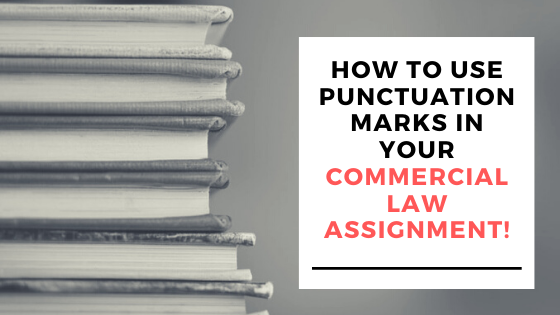
Commercial law has various laws that come under it. Companies law, Property law, Competition law, Consumer protection, Contract law, Taxation Law, Corporate Law, Labour laws and International trade law comes under commercial law. Commercial law deals with laws related to relations, rights and conduct with other businesses engaged in sale and trade. Any issues related to banking or insurance also comes under it. The popularity of the subject due to its wide scope has made various students opt it as a subject in their higher education.
Due to the complexity of the subject, teachers frequently give commercial law assignments to the students to increase their understanding in the field. These assignments help the students to improve their written communication skills and critical thinking ability. But students find it difficult to manage their time and energy between regular studies and these assignments. Even if they manage to write assignments, they ignore small things like punctuation in their work.
Punctuation are important to create clarity and sense in a document. They help in correct reading and improved understanding of the matter. Small punctuation mistakes can adversely affect your assignment. Today we will discuss the right way to use different punctuation marks in your commercial law assignment.
The different punctuation marks are –
- Comma (,)
- Full Stop (.)
- Exclamation Mark (!)
- Question Mark (?)
- The Semi-Colon (;)
- Colon (:)
- Apostrophe (')
- Quotation Marks (“ ”)
- Hyphen (-)
1. The Comma (,) – A comma has many uses –
- It can be used to separate items in a list, e.g. car, trains, buses and planes.
- Different parts of the sentence can be separated using the comma, e.g. ‘Everyone agreed with me, except Ria.’
- To indicate a pause, e.g. ‘Hello, How are you?’
2. Full Stop (.) – It is used to -
- End a sentence.
- It is also used in abbreviations like B.C.
- A series of three periods, also called ellipses, are used to indicate that a part of the sentence has been omitted.
3. Exclamation Mark (!) – It is used to –
- Express a strong emotion, e.g. ‘Alas! I failed to do my task. ‘
- It accentuates the feeling and makes the statement stronger, e.g. ‘Well Done!’.
4. Question Mark (?) – It is used to -
- Denote a question or a query like ‘How are you doing?’
5. Semi-Colon (;) – It is used to –
- Connect two independent phrases in a single sentence like ‘Sam made cookies today; it was his first cooking experience.’
- Separate lists with commas, e.g. ‘They were driving Etios, Amaze; Maruti, BMW.’
6. Colon (:) – It is used to -
- Introduce things like ‘It had two levels: primary and secondary.’
- In a heading or title like ‘Commercial Law: A subject related to business legal issues.’
7. Apostrophe (‘) – It is used to –
- Indicate ownership, e.g. ‘This is Sam’s car.’
- To omit some letters like Don’t, It’s, Shouldn’t, etc.
8. Quotation Marks (“ ") – It is used to -
- Mark speech or quoting someone else’s statement like My mother said: “Do your homework fast.”
9. Hyphen (-) – It is used to -
- To indicate that the word is too long to fit in the line.
- To join two words that represents an idea like ‘well-behaved’.
The correct use of punctuation marks in your commercial law assignment will make it stand out of the crowd. It shows how well you understand the feelings of each statement of your document.
Summary: The proper use of punctuation marks in your commercial law assignment can completely change the way it looks. Rightly used punctuation marks can improve your assignment drastically.